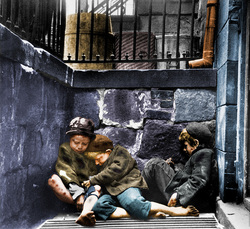 February, 2014 I used to fast on a semi-regular basis. That was when I was younger and more zealous in my faith. So, why did I quit? Other concerns took over, I guess. Job and career, and now a family to care for. It would be not only incorrect but blasphemous of me to say fasting is a luxury now. From my memory, it's anything but a luxury. It's inconvenient and unproductive, which is probably the biggest reason I and most people don't do it. Also, there's nothing fast about fasting. It's a discipline that requires lots of patience, and the benefits are often not obvious. The forty days before Easter in the Christian calendar are normally referred to as "lent," a time for fasting, self-reflection and assessment, a preparation for receiving the sacrifice of Jesus and his victory over pain and death. A recent message at my church on Psalm 6 made me think more about fasting again. The pastor never mentioned fasting, but I caught a sense of it from what he and the text were saying. I don't normally engage in exegesis, but as I looked over Psalm 6, I saw the journey of the writer (presumed King David) that seemed to be a microcosm of a greater narrative of faith. It's only a short 20-line poem (see text below), but it expresses the scope of the biblical narrative from fall to redemption to restoration. First, David agonizes with God, pleading with him not to discipline him. We're not sure what kind of anguish he was in, but the threat is so severe it feels like he may die. It's very reminiscent of Jesus in Gethsemane. Then David rationalizes with God, arguing that he would be no good to God as a dead man. How would he be able to praise him before his people? There might even be a hint of manipulation in his argument, but hey, who am I to judge. When you're desperate, you try anything. This is raw human agony. David hasn't stopped crying day and night. He complains how his enemies, real or imagined, are getting the best of him. And this brief Psalm ends on a triumphant note, declaring David's confidence in how God has heard his pleadings and delivered him from his enemies. Then it struck me that in essence this is what fasting, at least in part, is about. When I was in the middle of a fast, I remember groaning and feeling like I was wasting away. I remember thinking, when the hunger pangs intensified, that I didn't want God's discipline. I can remember bargaining, with myself and God, that I wasn't doing my family, my students, or God any good in a condition of weakness, headaches and grumpiness. I couldn't work efficiently, much less feel grateful to God. And then, after I had broken fast, I remember feeling the triumph: relief from my agony and restoration to my original state. What I perhaps more aptly appreciate now is that fasting and lent is not simply navel gazing. It's also not only about me and God and about toughening up my faith. It is certainly about drawing my focus to God, on whom I depend completely for life. But that's not all. Fasting is also a way of participating in King David's agony, and in the agony of the world. As a king, David had to bear the burdens of his people and his kingdom. I also am called to participate in the brokenness and suffering of creation, of mankind, of my friends and community, and then bring us all before God our provider, healer, and restorer. As such, I am truly being faithful to Jesus, foreshadowed by King David and remembered in lent. For ultimately Jesus in his sufferings took on the agony of his creation, of us all. And finally, as Isaiah 58 puts it, for my fasting to be complete it should motivate me to "loose the chains of justice" and "set the oppressed free." I think I'll give fasting another try, but with a greater purpose in mind. Psalm 6 1 Lord, do not rebuke me in your anger or discipline me in your wrath. 2 Have mercy on me, Lord, for I am faint; heal me, Lord, for my bones are in agony. 3 My soul is in deep anguish. How long, Lord, how long? 4 Turn, Lord, and deliver me; save me because of your unfailing love. 5 Among the dead no one proclaims your name. Who praises you from the grave? 6 I am worn out from my groaning. All night long I flood my bed with weeping and drench my couch with tears. 7 My eyes grow weak with sorrow; they fail because of all my foes. 8 Away from me, all you who do evil, for the Lord has heard my weeping. 9 The Lord has heard my cry for mercy; the Lord accepts my prayer. 10 All my enemies will be overwhelmed with shame and anguish; they will turn back and suddenly be put to shame.
0 Comments
Leave a Reply. |
Archives
January 2024
Categories |
 RSS Feed
RSS Feed